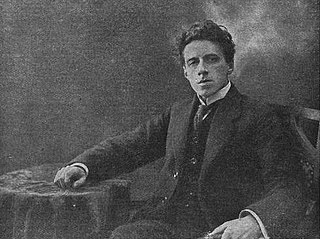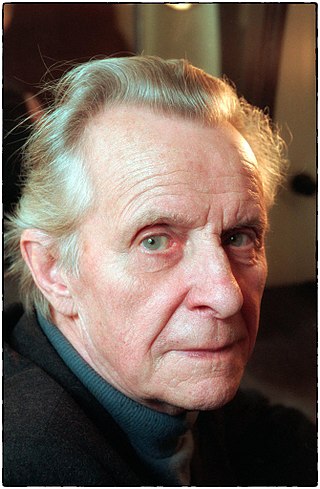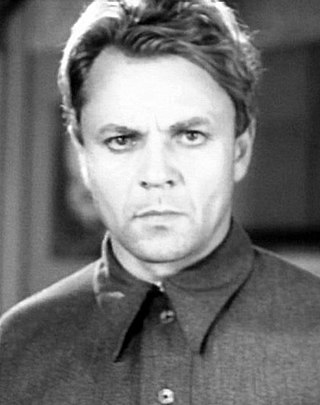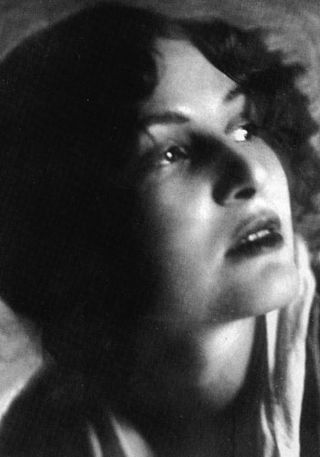
Vsevolod Illarionovich Pudovkin was a Soviet film director, screenwriter and actor who developed influential theories of montage. Pudovkin's masterpieces are often contrasted with those of his contemporary Sergei Eisenstein, but whereas Eisenstein utilized montage to glorify the power of the masses, Pudovkin preferred to concentrate on the courage and resilience of individuals. He was granted the title of People's Artist of the USSR in 1948.

Vsevolod Emilyevich Meyerhold was a Russian and Soviet theatre director, actor and theatrical producer. His provocative experiments dealing with physical being and symbolism in an unconventional theatre setting made him one of the seminal forces in modern international theatre.

Igor Vladimirovich Ilyinsky was a Soviet and Russian stage and film actor, director and comedian. Hero of Socialist Labour (1974) and People's Artist of the USSR (1949).

Oleksandr-Zenon Stepanovych Kurbas, was a Ukrainian movie and theater director. He is considered by many to be the most important Ukrainian theater director of the 20th century. He formed, together with Vsevolod Meyerhold, Yevgeny Vakhtangov and several other directors, the Soviet theater avant-garde in the 1920s and 1930s. He is one of the most prominent representatives of Ukrainian avant-garde art. He is considered to be one of the lead figures of the Executed Renaissance. He was murdered by the Soviet regime, during Stalin's Great Terror.
Vsevolod or Wsewolod is a Slavic male first name. Its etymology is from Slavic roots 'vse' (all) and 'volodeti' and means 'lord-of-everything/everybody',. It is equivalent to the Belarusian Usievalad, Polish Wszewład, Lithuanian Visvaldas, Latvian Visvaldis and German Wissewald. The corresponding Russian patronymic is Vsevolodovich.

Nikolai Robertovich Erdman was a Soviet dramatist and screenwriter primarily remembered for his work with Vsevolod Meyerhold in the 1920s. His plays, notably The Suicide (1928), form a link in Russian literary history between the satirical drama of Nikolai Gogol and the post-World War II Theatre of the Absurd.

Yevgeny Valerianovich Samoylov was a Soviet actor who gained prominence in youthful heroic parts and was named a People's Artist of the USSR in 1974. He was the father of Tatiana Samoilova.
Boris Yevgenyevich Zakhava was a Soviet and Russian actor, theater director, pedagogue and theater theorist. People's Artist of the USSR (1967).

Storm over Asia is a 1928 Soviet propaganda film directed by Vsevolod Pudovkin, written by Osip Brik and Ivan Novokshonov, and starring Valéry Inkijinoff. It is the final film in Pudovkin's "revolutionary trilogy", alongside Mother (1926) and The End of St. Petersburg (1927).

Sergei Iosifovich Yutkevich was a Soviet film director and screenwriter. He was a People's Artist of the USSR (1962) and a Hero of Socialist Labour (1974).

Nikolay Ivanovich Bogolyubov was a Soviet actor born in Ivanovskoye, Russian Empire and a People's Artist of the RSFSR (1945). In 1933 he played in Boris Barnet's Okraina; in 1941, he was awarded the Stalin Prize.

Vasili Vasilyevich Merkuryev was a Soviet and Russian stage and film actor, theater director and pedagogue. People's Artist of the USSR (1960).
Mikhail Ivanovich Doller was a Soviet film director and screenwriter. He worked as co-director with Vsevolod Pudovkin and was awarded Stalin Prize twice in 1941.

Admiral Nakhimov is a 1947 Soviet biopic film directed by Vsevolod Pudovkin, based on the life of Russian Admiral Pavel Nakhimov (1802-1855). In 1946 Pudovkin, Golovnya, Lukovsky, Kryukov, Dikiy, Simonov, and Knyazev received the Stalin Prize.

Valery Vladimirovich Fokin is a Soviet and Russian theatrical and film director, actor and pedagogue. He is the Artistic Director of the Alexandrinsky Theatre in Saint Petersburg, and the President of The Meyerhold Centre in Moscow. Fokin is decorated with four honorary Russian state awards.

Vladimir Pavlovich Fogel was a Russian silent film actor.

Zinaida Nikolayevna Reich was a Russian actress and one of the main stars of the Meyerhold Theatre until it was closed under Joseph Stalin.

The following lists events that happened during 1953 in the Union of Soviet Socialist Republics.
Porfiri Artemyevich Podobed was a Soviet film director, actor and manager at the Moscow Art Theatre.

The Nose or the Conspiracy of Mavericks is a 2020 Russian animated film. The film is created by the animation studio School-Studio "Shar". People's Artist of Russia animator, Andrei Khrzhanovsky directed the film. The film is based on the Russian classic, The Nose by Nikolai Gogol. The script writers Yuri Arabov and Andrei Khrzhanovsky adapted the 19th-century prose of Gogol as well as the verses of the opera of the same name by Dmitri Shostakovich into an animated film featuring a mixture of drawings, cut-outs, live-action, and documentary style filming.
















